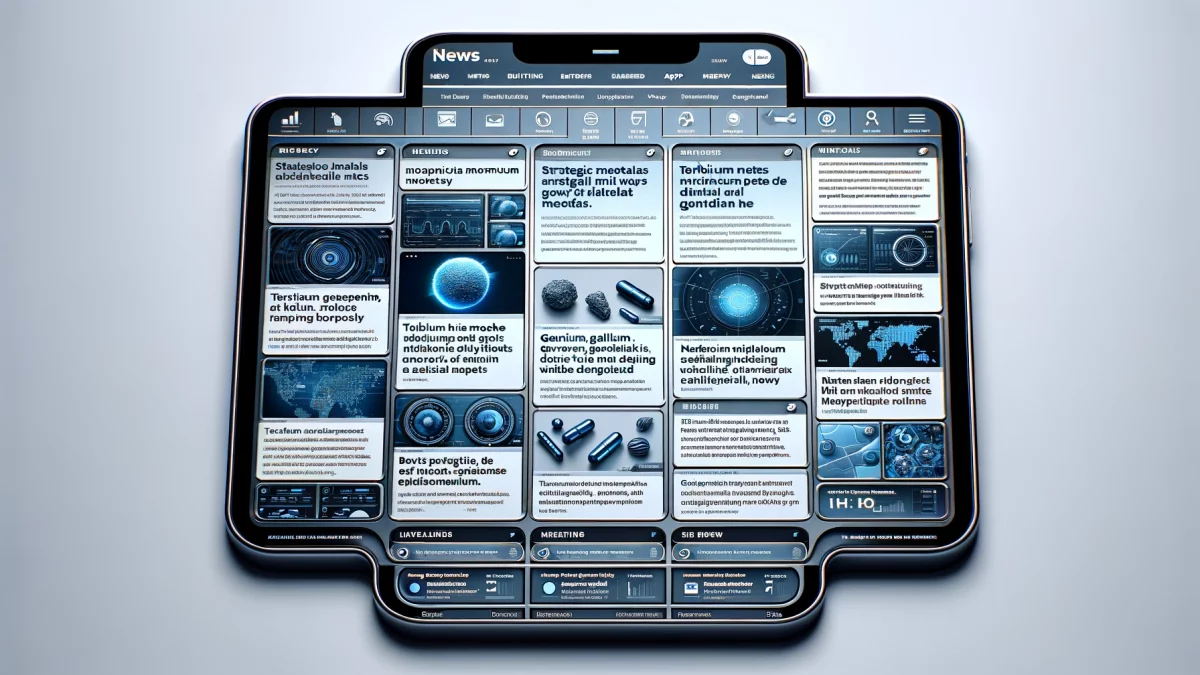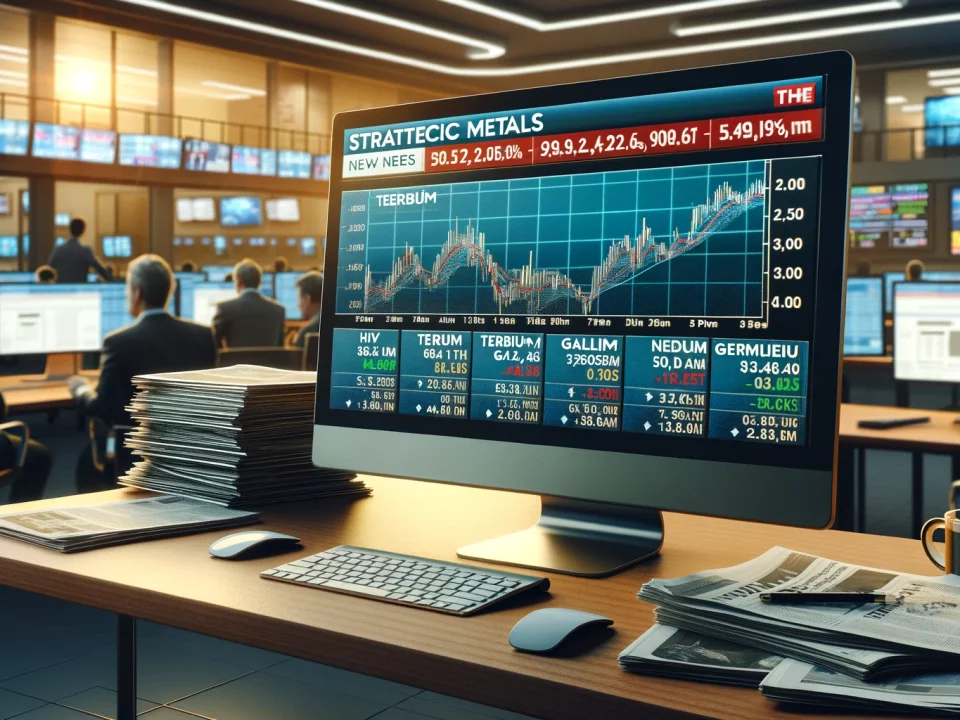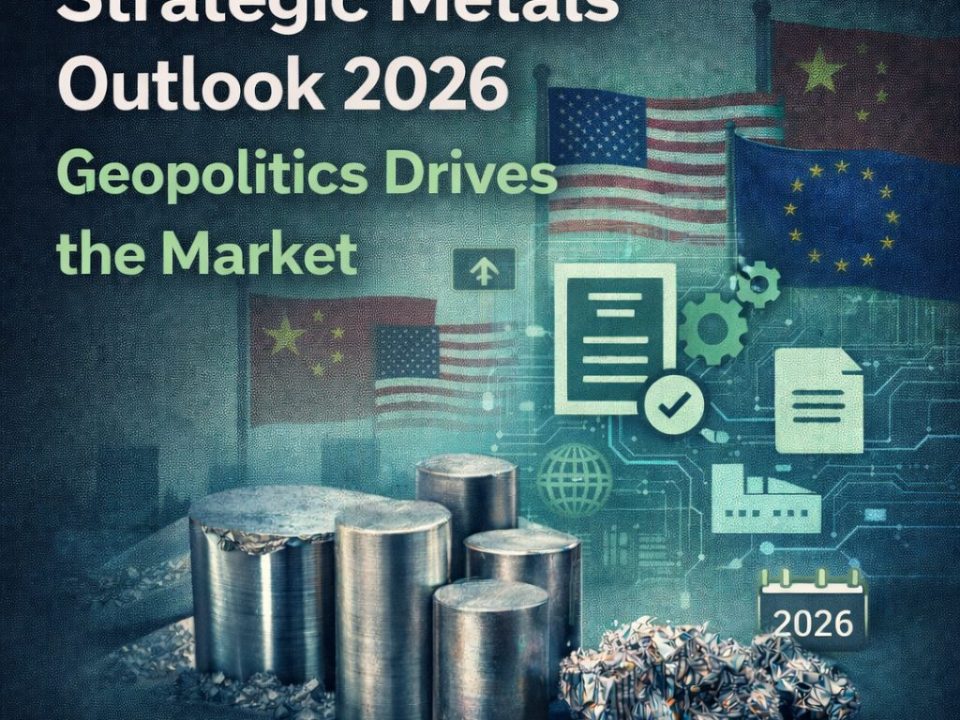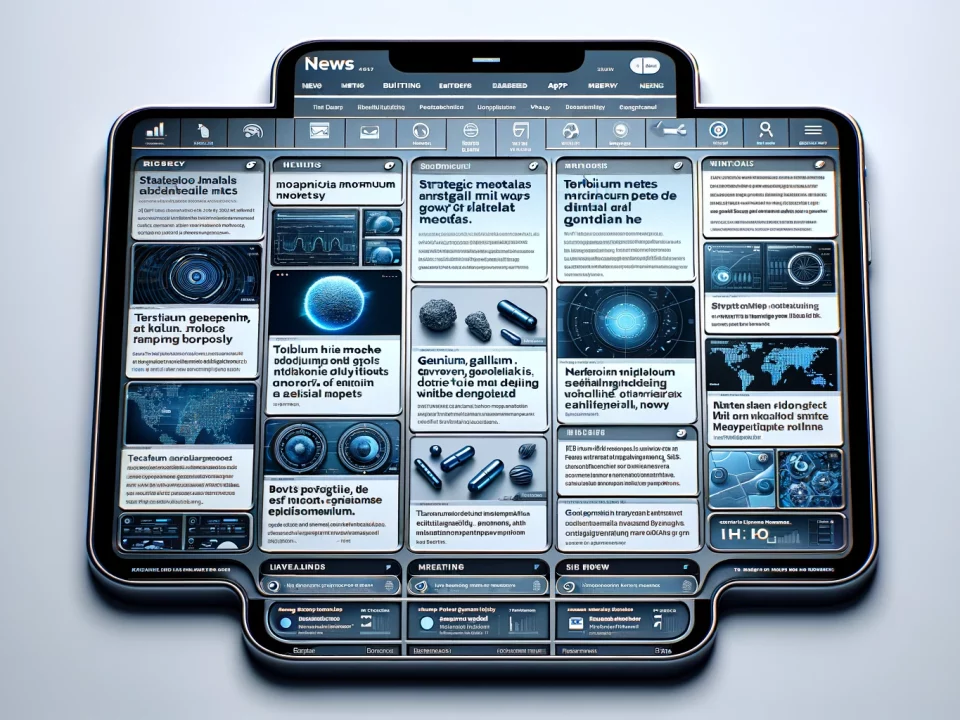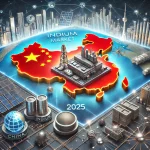
Indium Market Outlook 2025: Rising Prices, Geopolitical Shifts, and Future Potential
November 26, 2024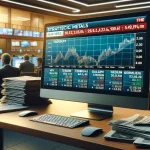
Weekly News Review December 2 – December 8 2024
December 8, 2024Greetings from the strategic metals newsroom,
Greenland, India, and Saudi Arabia—this week’s focus was on emerging players in the critical minerals sector. While Greenland in the high North could emerge as a mining hub, India is pushing forward with deep-sea mining. In between, the Kingdom of Saudi Arabia inked deals worth billions to develop its domestic mining sector.
….. All the details are in our weekly roundup.
AUSTRALIA INTRODUCES TAX INCENTIVES FOR STRATEGIC METALS PRODUCTION:
On Monday, the Australian government introduced a bill to Parliament to implement tax incentives for renewable hydrogen and critical mineral production. The Future Made in Australia (Production Tax Credit and Other Measures) Bill 2024 represents a $4.5 billion (AUS$7 billion) commitment to the sector and is a central component of the overarching Future Made in Australia initiative, which Prime Minister Anthony Albanese unveiled in April.
In detail, the now-introduced legislation contains two provisions: a hydrogen production credit, which provides companies with roughly $1.3 per kilogram produced, and a critical mineral production credit, which provides ten percent of processing and refining costs for Australia’s 31 crucial minerals.
Mining alone will not be eligible for the measures, a move praised by the Association of Mining and Exploration Companies (AMEC). In a press statement, the association emphasized Australia’s critical mineral potential, adding that incentivizing companies to invest in value-adding production benefits the whole economy and would “outweigh the cost of the incentive.”
In addition to these requirements, companies must bring benefits relating to the six Community Benefits Principles introduced under the Future Made in Australia bill, including promoting secure jobs and positive impacts on the domestic economy. The complete requirements will be detailed by rules set by the Treasurer, which are yet to be determined.
SOUTH KOREA AND MALAYSIA JOIN FORCES FOR STRATEGIC METALS:
Despite being a high-tech powerhouse, South Korea is considered resource-poor, whereas Malaysia boasts vast, largely untapped reserves of rare earths.
According to The Korea Herald and other outlets, on Monday, South Korea and Malaysia established a strategic partnership to strengthen cooperation in key areas such as trade, clean energy, and critical raw materials. Malaysian Prime Minister Anwar Ibrahim formalized the partnership during a state visit to South Korea, where he met with President Yoon Suk Yeol.
South Korea is a leading high-tech producer but needs more raw materials for its industry. The new agreement with Malaysia is part of a broader strategy involving recent partnerships with resource-rich nations like Peru and several Central Asian states. Malaysia aims to significantly expand its critical minerals sector, including boosting the relatively low production of rare earth elements. Concurrently, the country has announced an export ban on these elements to benefit from downstream value-adding.
According to the Malaysian Investment Development Authority, the precious deposits of medium and heavy rare earths in ion-adsorption clays are vital to global supply chains. These deposits are currently only mined by China and its neighbor Myanmar. Malaysia’s pivotal role in the rare earth industry has thus far been as the host of the world’s largest refinery outside China, operated by Australian company Lynas.
According to Reuters, the two leaders also expressed their commitment to finalizing a free trade agreement by next year. The Korea Herald reported that Malaysia is South Korea’s third-largest trading partner and the fourth-largest destination for investment among the ten ASEAN member states, a group of Southeast Asian countries striving for economic integration.
CHINA PLEDGES TO SAFEGUARD STABILITY OF GLOBAL SUPPLY CHAINS:
Premier Li Qiang said at a symposium ahead of the 2nd China International Supply Chain Expo in Beijing that China pledges to contribute to upholding the stability of international supply chains. Li highlighted China’s role as a key link in global supply chains and vowed that the People’s Republic would take necessary actions to ensure their stability and work with international partners to transform and upgrade them.
Li added that opening up to the outside world and further expanding market access to China are central to this. Companies attending the meeting included international corporations such as Sumitomo Electric Industries, Apple, Rio Tinto, CATL, Lenovo Group, and the U.S.-China Business Council.
Li urged businesses and partners to strengthen international cooperation and called for opposing decoupling efforts and protectionist policies, as secure and stable supply chains would benefit all parties involved.
The remarks come amidst challenging times for global supply chains and the People’s Republic. While efforts are underway internationally to diversify and derisk supply chains in China-dominated fields, such as critical minerals, the newly elected U.S. President Donald Trump has threatened to impose new tariffs on China on top of existing ones current President Joe Biden announced in May.
In addition, the European Union’s levy on Chinese electric vehicles implemented in October has likely prompted the People’s Republic to impose its tariffs on EU-made brandy and launch an anti-dumping investigation in a European port.
USA: RIVIAN SECURES $6.6 BILLION FROM DEPT. OF ENERGY TO BUILD ELECTRIC VEHICLE PLANT IN GEORGIA:
The facility will produce mid-sized electric SUVs that are price-competitive with gas-powered vehicles.
U.S. electric vehicle manufacturer Rivian announced Monday that it has received conditional approval for a $6.6 billion loan from the Department of Energy to construct a new manufacturing facility in Georgia. At the plant in Stanton Springs North, Rivian plans to produce mid-sized electric SUVs that are “price-competitive” with comparable gas-powered vehicles.
The facility will be constructed in two phases. The first phase will launch in 2028 and can produce 200,000 vehicles annually. The second will double the capacity and is expected to be finalized in 2030.
Less than two weeks ago, Rivian launched a $5.8 billion joint venture with German carmaker Volkswagen. Under the cooperation, the companies aim to profit from each other’s expertise—Rivian seeks to scale up its production capacities more effectively while Volkswagen gains access to crucial EV technology.
Besides the need to scale up production, Rivian faces multiple challenges: increasing competition at home and from abroad and incoming President-elect Donald Trump, who repeatedly called to end tax credits for purchasing electric vehicles under President Joe Biden’s landmark Inflation Reduction Act.
SAUDI ARABIA INKS MAJOR MINING DEALS FOR RARE EARTH MINING:
Deals were announced during the World Investment Conference in Riyadh.
Saudi Arabia has signed multiple deals with international companies to accelerate the development of its mining and metals sector. Reuters said nine agreements worth $9 billion were finalized during the World Investment Conference in Riyadh. These deals include India’s Vedanta conglomerate, which will invest $2 billion in copper smelting and refining facilities.
Australian miner Hastings will build processing facilities worth roughly $1.5 billion in the rare earths field. In July, the company initially floated the Kingdom as a location for downstream production of its Yangibana project in Western Australia. Canadian Platinum Group Metals will explore setting up a $500 million platinum group metals smelter and base metals refinery in the platinum sector. Other projects include zinc and other critical minerals.
The investments align with Saudi Arabia’s Vision 2030, an initiative under which the Kingdom seeks to diversify its industrial and mineral resources sectors away from fossil fuels. By 2030, Saudi Arabia plans to reduce the oil industry’s share of its GDP to eleven percent.
In 2022, it publicly highlighted its mineral wealth and opportunities, adding that the sector’s role is projected to grow further (we reported). For mining, the country seeks international support, for example, from Australia. As another alley to profit from critical minerals, in late 2023, the Kingdom floated the idea of setting up a trading platform for essential minerals that are currently not publicly traded.
DEEP SEA MINING: INDIA TO AUCTION OFF FIRST TRANCHE OF MINERAL BLOCKS –
India will launch its first-ever auction of offshore mineral deposits on Thursday. According to the Ministry of Mines, the auction comprises 13 blocks spread across the Arabian and Andaman Sea, consisting of construction sand, lime mud, and polymetallic nodules. These nodules mainly contain manganese and iron oxide but also economically attractive metals like nickel, cobalt, lithium, and rare earth elements.
In 2023, the Indian Parliament amended the Offshore Areas Mineral Act of 2002, introducing auctions as the primary method to allocate mineral blocks. This enabled the government to let the private sector participate in bidding for offshore resources, paving the way for the first auction.
One of the First Nations to Issue Exploration Permits:
With the auction, India is set to become one of the first nations to meddle with deep-sea mining, a highly controversial topic. While countries such as the UK and Germany have called for a moratorium on issuing deep-sea mining permits in the past, arguing that the environmental impact is yet to be entirely determined, others are spearheading the topic, for example, Norway, which aims to award the first exploration permits for its continental shelf in 2025 (we reported).
India believes offshore mining is one solution to satisfy its growing need for raw materials and critical minerals. In its press statement, the Ministry of Mines highlighted the economic and strategic opportunities deep-sea mining holds for the country. Last year, the government published the “Critical Minerals for India” list, containing 30 elements considered crucial for economic development and national security. Currently, India imports most of the catalog’s contents from foreign nations.
The new initiative seeks to change this; according to the Ministry, it will help India become a “global leader in critical minerals.”
RARE EARTHS AND GALLIUM: IS GREENLAND THE KEY TO FUTURE RESOURCE SECURITY?
Critical Metals Corp reports drilling results from its Tanbreez rare earth deposit.
The Tanbreez deposit in southern Greenland is emerging as a critical contender in reducing global reliance on China for rare earth supplies. With an estimated 19 million tons of rare earth elements, the deposit includes up to 30% of the highly coveted heavy rare earths, such as dysprosium and terbium. Now, its potential value has climbed even higher: according to U.S.-based Critical Metals Corp, the majority owner, recent drilling has uncovered one of the world’s highest concentrations of gallium, a critical and increasingly strategic resource.
Gallium, a critical mineral primarily obtained as a byproduct of bauxite mining, is indispensable for producing computer chips, solar panels, and LEDs. As the world’s leading supplier, China imposed export restrictions on gallium in mid-2023, briefly limiting its global availability.
Tony Sage, CEO and Executive Chairman of Critical Metals Corp, emphasized the deposit’s substantial investment potential. He announced that the company intends to conduct further exploration and evaluate the economic viability of mining operations to unlock this critical resource.
Enormous Resource Potential and Challenges in Greenland:
Greenland, rich in natural resources, has increasingly captured the attention of Western nations aiming to diversify their supply chains. Just days ago, U.S. Undersecretary of State Jose W. Fernandez visited the island, placing critical minerals at the forefront of discussions. Similarly, European Commission President Ursula von der Leyen traveled to Greenland in March, culminating in a raw materials partnership agreement later in December.
Beyond Tanbreez, several other rare earth projects in Greenland are gaining traction. Neo Performance, which operates one of Europe’s few rare earth processing facilities in Estonia, is advancing the Sarfartoq project in the island’s southwest.
In contrast, Australia’s Energy Transition Minerals continues encountering hurdles with its Kvanefjeld project further south, constrained by Greenland’s stringent mining regulations introduced in late 2021.
MADAGASCAR LIFTS MINING SUSPENSION FOR TOLIARA PROJECT:
The deposit contains titanium, zirconium, and rare earth-host minerals.
The government of Madagascar has lifted the suspension of U.S. mining company Energy Fuels’ Toliara mining project in the southwest of the island nation. According to the company, this marks a significant step towards further developing the deposit. Energy Fuels gained access to Toliara by acquiring Australian rare earth miner Base Resources earlier this year.
Base Resources held permits to mine titanium and zirconium minerals at Toliara; however, the Madagascan government suspended all operations in 2019 to renegotiate fiscal terms. Energy Fuels now seeks to expand the mining permits to rare earth host minerals and will recommence development and investment in the project. The company added that it would work towards a final investment decision expected to be made in early 2026.
Energy Fuels is one of the largest uranium producers in the United States. The company has recently begun diversifying its production by adding other minerals to its portfolio. Besides acquiring Base Resources, the company purchased the Bahia rare earth project in Brazil in 2022 and is co-developing the Donald rare earth and mineral sands project in Australia with local miner Astron.
UK: RARE EARTHS PARTICULARLY CRITICAL –
Critical Minerals Intelligence Centre publishes assessments on critical raw materials.
Since 2022, the Critical Minerals Intelligence Centre (CMIC) has been advising the United Kingdom on issues related to critical raw materials. This week, the Centre released an assessment of the current supply situation. The study covers a total of 82 raw materials, 34 of which are considered critical. Among these, niobium, cobalt, and rare earth elements are classified as particularly critical – essential for various applications, from energy supply to defense. Niobium is crucial for steel production, cobalt is needed for batteries, including those used in electric vehicles, and rare earth elements are used in the motors of these vehicles.
The last assessment of the UK’s raw material situation was conducted in 2021, and it included 26 resources in the evaluation. The following year, the UK released its first strategy for critical minerals, updated in 2023.
MALAYSIA: TWO RARE EARTH REFINERIES PLANNED FOR 2027 –
The Southeast Asian country seeks to harness more of its raw material reserves for domestic use and become a leading producer of rare earths.
Historically, Malaysia’s role in the rare earth industry has been centered around hosting the largest refinery outside of China, operated by the Australian company Lynas. However, the Southeast Asian nation now aims to develop its rare earth production capacity, increasing extraction from its largely untapped reserves—currently, only about 80 tons (PDF) of rare earths are mined annually. Until now, Malaysia has lacked a complete value chain for processing these critical materials after extraction.
To fill this gap, Economic Minister Rafizi Ramli announced plans to build two processing plants within the next three years, the Malayan Reserve reported. Investments in infrastructure and strategic partnerships will support these projects. This week, Malaysia signed a cooperation agreement with South Korea (we reported).
China: Both Competitor and Partner –
Minister Ramli warned that without developing its own rare earth industry, Malaysia risks exporting its raw materials at low prices to China. Such a scenario could result in the rapid depletion of its rare earth deposits and the loss of valuable investment opportunities. In response, Malaysia is turning to China’s expertise to help build its rare earth industry and develop a local value chain.
To encourage domestic processing, Malaysia has also implemented an export ban on raw rare earths, aiming to increase the value of exports by sending processed materials abroad. However, this move has faced resistance from local state governments, which currently receive royalties from exporting unprocessed raw materials. According to Free Malaysia Today, state governments may pressure the central government to reconsider the policy if the new processing plants are completed outside the three-year timeline.
If you would like to learn more about the benefits of owning strategic metals as physical assets, then contact us for a free, no-obligation online presentation at your convenience.



